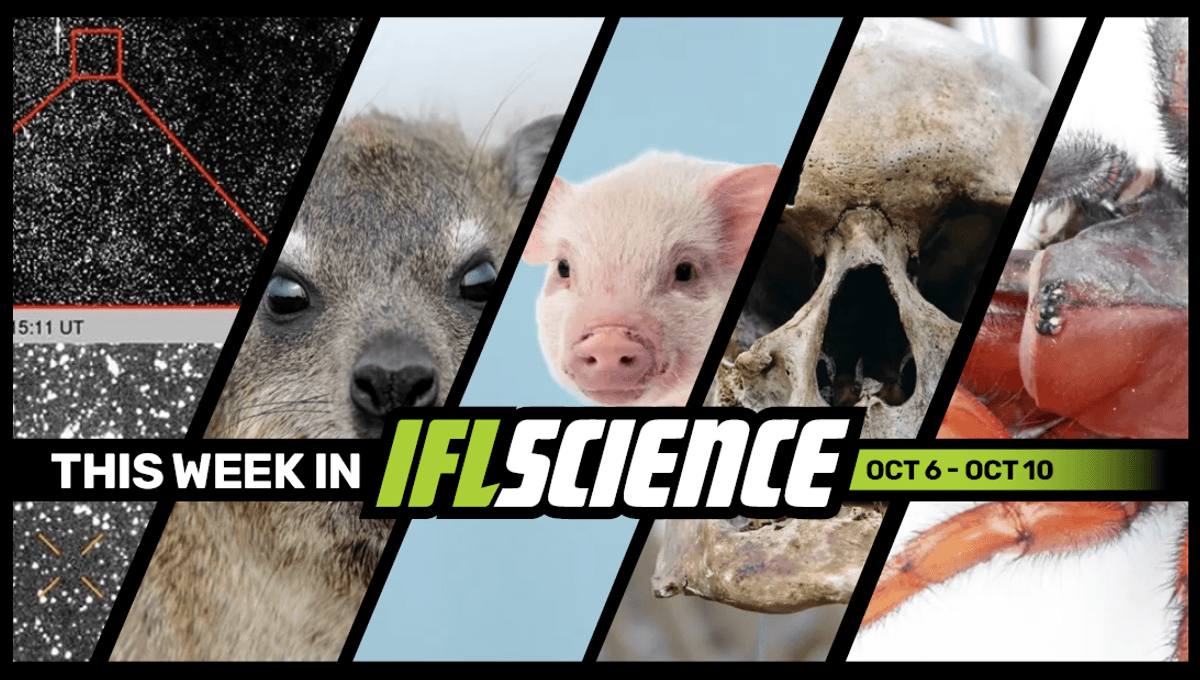Interstellar Object 3I/ATLAS May Be 10 Billion Years Old, This Rare Spider Is Half-Female, Half-Male Split Down The Middle, And Much More This Week

Interstellar Object 3I/ATLAS May Be 10 Billion Years Old, This Rare Spider Is Half-Female, Half-Male Split Down The Middle, And Much More This Week
This week, the world’s first butt-drag fossil shows a 126,000-year-old hyrax scooting across the ground, the first-ever living recipient of a pig-to-human liver transplant survived for 171 days, and a new study is questioning evidence of the long-assumed “oldest human habit”. Finally, we explore a “truly exceptional” 125-million-year-old two-headed reptile fossil.
The rest of this article is behind a paywall. Please sign in or subscribe to access the full content. A team of astronomers has attempted to track the path of interstellar object 3I/ATLAS back into the past, tracing its path through the galaxy in simulations involving over 13 million stars. In a new paper submitted to the Astrophysical Journal, but not yet peer reviewed, a team from the University of A Coruña tracked the object's trajectory using gravity to work backwards and trace its path. Read the full story here Do you ever stop and think about how wonderful it is that it’s so easy for you to scratch your butt? No? Well, perhaps a first-of-its-kind fossil can inspire you to practice a little more gratitude, as it reveals the butt-drag of a rock hyrax committed to the fossil record 126,000 years ago, a world-first in fossils. Read the full story here A 71-year-old man in China became the first ever living recipient of a liver transplant from a genetically modified pig, as detailed in a new case report. The surgery was initially deemed successful, but complications arose, and the patient died on day 171 post-surgery. The team behind the procedure says it’s evidence that pig liver transplants can move beyond the theoretical, though we still have some way to go in refining this technology. Read the full story here Nail-biting and nose-picking have probably been around since our ancient ancestors walked the Earth, but these habits don’t leave much of a physical trace. Tooth-picking, on the other hand, does – or so it was thought. In fact, it was considered the "oldest human habit" in the fossil record. A new study is challenging old assumptions by analyzing over 531 teeth from 27 different primates, including both extinct and living species, and looking for the dental notches using high-tech imaging tools, like 3D scanners and microscopes. Read the full story here This pocket-sized new spider is rocking a unique look. Near perfectly split down the middle, its left legs are dark orange while its right is a whitish salt-and-pepper color. Remarkably, this is not just an aesthetic division: one side of the body is female and the other is male. Read the full story here In 2006, a study published in the journal Biology Letters described a fossil unlike any ever seen before. It captured a prehistoric reptile that lived around 125 million years ago. That, in itself, wasn’t terribly surprising, but the fact that it had two heads really, really was. “To think just how rare bicephalism is in the world today, combined with the fact that fossilisation is incredibly rare, this fossil is truly exceptional,” palaeontologist, author, and science communicator Dr Dean Lomax told IFLScience. Read the full story here Have you seen our e-magazine, CURIOUS? Issue 39, October 2025, is available now. This month, we asked, “What Actually Is Fear?” – check it out for exclusive interviews, book excerpts, long reads, and more. PLUS, the We Have Questions podcast – an audio version of our coveted CURIOUS e-magazine column – continues. In episode 13, we ask, “Can Transplants Change Your Personality?” The Big Questions podcast has returned, and we’re continuing season 5 with episode 9’s big question: What Is Time And How Do We Measure It?Create an IFLScience account to get all the biggest science news delivered straight to your inbox every Wednesday and Saturday.
Interstellar Object 3I/ATLAS May Be A 10-Billion-Year-Old Time Capsule From An Earlier Age Of The Universe
Behold! The World’s First Butt-Drag Fossil, Committed By A Rock Hyrax 126,000 Years Ago
First-Ever Living Recipient Of A Pig-To-Human Liver Transplant Survived For 171 Days
Is This Evidence Of The "Oldest Human Habit"? A New Study Has Different Ideas
This Rare Spider Is Half-Female, Half-Male Split Down The Middle – Oh, And A New Species
TWIS is published weekly on our Linkedin page. Join us there for even more content.
Feature of the week:
Check Out This “Truly Exceptional” Fossil Of A Two-Headed Reptile That Lived 125 Million Years Ago
More content:


